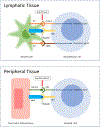Cardiovascular Toxicities Associated with Cancer Immunotherapies
- PMID: 28220466
- PMCID: PMC10176498
- DOI: 10.1007/s11886-017-0835-0
Cardiovascular Toxicities Associated with Cancer Immunotherapies
Abstract
Purpose of review: We review the cardiovascular toxicities associated with cancer immune therapies and discuss the cardiac manifestations, potential mechanisms, and management strategies.
Recent findings: The recent advances in cancer immune therapy with immune checkpoint inhibitors and adoptive cell transfer have improved clinical outcomes in numerous cancers. The rising use of cancer immune therapy will lead to a higher incidence in immune-related adverse events. Recent studies have highlighted several reports of severe cases of acute cardiotoxic events with immune therapy including fulminant myocarditis. We believe that immune-mediated myocarditis is a driving mechanism behind these cardiovascular toxicities and requires vigilant screening and prompt management with corticosteroids and immune-modulating drugs, especially with combination immune therapies. While the incidence of serious cardiovascular toxicities with immune therapy appears low, these can be life-threatening especially when manifesting as acute immune-mediated myocarditis. Further collaborative studies are needed to effectively identify, characterize, and manage these events.
Keywords: CTLA-4; Cardiovascular toxicities; Checkpoint inhibitors; Immune therapy; Myocarditis; PD-1.
Conflict of interest statement
Compliance with Ethical Standards
Douglas B. Johnson reports being on the advisory board for BMS and Genoptix, and grants from Incyte.
Javid J. Moslehi reports personal fees from Pfizer, Novartis, Bristol-Myers Squibb, Takeda, Ariad, Vertex, Acceleron, Incyte, Verastem, RGenix, StemCentRx, Heat Biologics, and Pharmacyclics
Figures
References
-
- Kragel AH, Travis WD, Steis RG, Rosenberg SA, Roberts WC. Myocarditis or acute myocardial infarction associated with interleukin-2 therapy for cancer. Cancer. 1990;66(7):1513–6. - PubMed
-
- Sonnenblick M, Rosin A. Cardiotoxicity of interferon. A review of 44 cases. Chest. 1991;99(3):557–61. - PubMed
-
- Roth ME, Muluneh B, Jensen BC, Madamanchi C, Lee CB. Left ventricular dysfunction after treatment with ipilimumab for meta-static melanoma. Am J Ther. 2016;23(6):e1925–e1928. - PubMed
Publication types
MeSH terms
Grants and funding
LinkOut - more resources
Full Text Sources
Other Literature Sources
Research Materials




